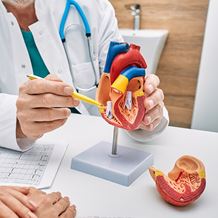
- Home
- Services
- Cardiac Services
- Imaging
- Computed Tomography Coronary Angiography (CTCA)
What is a computed tomography coronary angiography (CTCA)?
A computed tomography coronary angiography, or CTCA, investigates the coronary arteries that supply blood to the heart. A powerful X-ray machine produces detailed images that can be used to diagnose a variety of heart conditions, and this test is particularly effective in checking for blocked or narrowed arteries that may indicate coronary artery disease. This particular condition is caused by a gradual build-up of plaque (atherosclerosis) that makes it increasingly difficult for enough blood to reach the heart. CT coronary angiography testing looks at how effectively the blood can flow through the arteries by using a special dye to highlight the blood vessels and tissues. This type of CT imaging provides much greater detail than a traditional X-ray and is less invasive than a traditional coronary angiogram where a catheter is inserted to inject the contrast dye.
How does is it work?
CTCA testing is usually performed by a radiologist who specialises in this type of heart examination. During the test, a dye is injected intravenously into your arm to highlight the blood flow. Meanwhile, your heart rate and rhythm are monitored using electrodes that are linked between your chest and a special machine. The images are clearer if your heart rate is low, and so you may be given some medication in advance to slow down your heart rate. The CT scanner is responsible for generating all the images which can then be reformatted, reviewed, and shared electronically.
Why do I need it?
A computed tomography coronary angiography can show whether the important blood vessels that supply blood to the heart are working effectively. If a patient has blocked coronary arteries, they are at serious risk of developing coronary artery disease, angina, or heart failure. Your doctor may recommend CTCA testing if there are symptoms and information to suggest there may be a problem with your heart. These include:
- Chest pain or discomfort
- Unclear stress testing results
- Abnormal ECG results
- Reduced heart function
What does it test for? What does it show?
Computed tomography coronary angiography testing is a non-invasive way to investigate the health of your coronary arteries. These important blood vessels are responsible for making sure that enough blood is supplied to your heart. Using a special highlighting dye, the CTCA test enables your radiographer to take pictures from several angles to get information about the presence and extent of any potential plaque build-up in your arteries. It can also detect other conditions such as blood clots, a collapsed lung, or aortic abnormalities.
What's next?
If you have been experiencing heart-related symptoms, book an appointment with our cardiac services specialist today.
Our specialists in Cardiac Services
View all specialists





